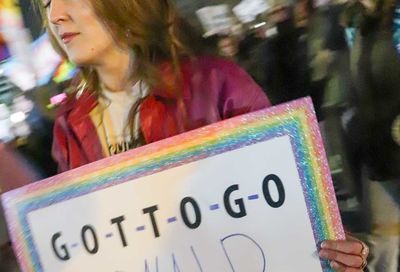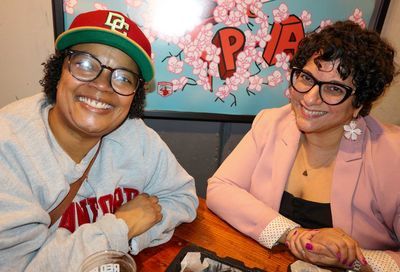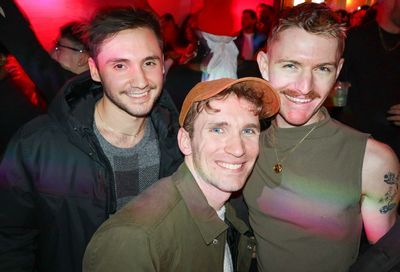TV Review: Matt Groening’s “Disenchantment” is just plain disenchanting
Matt Groening’s newest animated show fails to justify the need for its existence.

Matt Groening didn’t need to make a new TV show. As creator of The Simpsons, he has an estimated half a billion dollars in personal wealth, holds the record for the longest-running primetime show in U.S. television history, and has helped create a multi-billion dollar entertainment powerhouse that encompasses movies, games, music, theme park rides, and an almost ludicrous amount of merchandise.
The last time he tried creating something new, it was a decade after The Simpsons first aired on Fox. Futurama was more daring than its yellow-tinged cousin. It was snappier, zanier, but no less brilliant. Criminally underappreciated by audiences, it was canceled twice on two different networks, but stands tall alongside the first eight seasons of The Simpsons as proof that Groening knows what he’s doing.
That’s why the prospect of a new animated show from Groening is pretty tantalizing. With enough wealth to last multiple lifetimes, he isn’t doing it for the money. And by partnering with Netflix, he isn’t catering to the demands of broadcast restrictions and advertisers. A new show, dropping on a streaming platform, from the man who has gifted the world two of TV’s best animated shows? What’s not to love?
A lot, as it transpires. Disenchantment (![]()
![]()
![]()
![]()
![]() ) isn’t just a disappointment, it begs the question why Groening ever felt the need to make it. As a grand return to television, it’s the exact opposite of third time’s the charm.
) isn’t just a disappointment, it begs the question why Groening ever felt the need to make it. As a grand return to television, it’s the exact opposite of third time’s the charm.
A medieval fantasy described by one of the cast as “the offspring of The Simpsons and Game of Thrones,” Disenchantment is set in the kingdom of Dreamland, an ironically named city filled with death, depression, and drinking galore. It centers on Bean, an alcoholic princess desperate to escape the tedious trappings of her royal life, and each episode follows her various exploits as she tries to live free and command her own destiny. On this journey she’s joined by Elfo, an elf who fled from a land where everyone is always happy, and Luci, a demon who has been eternally bonded to Bean by mysterious, faraway forces.
It’s a curious setting, and one rich with comedic potential — class squabbles, mythological and fantastical creatures, the plague — but the end result is scattered, overstuffed, and frequently dull. Each episode runs close to half an hour in length, and Disenchantment — like a lot of Netflix’s comedic output — feels like it could use the editing restrictions of broadcast television to economize its joke-telling. What’s worse is that the opening episode is frequently laugh-out-loud funny, despite its need to establish Bean, Elfo, Luci, and the myriad other characters in this zany kingdom. But what follows just fails to match that momentum. Sure, you’ll laugh, but it’s the exception, not the rule.

Whether it’s Bean trying and failing to get a normal job, ultimately winding up as the kingdom’s executioner, or her attempts to throw a party in the castle while King Zøg and stepmother Queen Oona are at a spa — only for gatecrashing land vikings to try and seize the throne — the premise of each episode is sound, but the delivery falters. There are long stretches where exposition is being delivered, but the jokes just aren’t landing, or where the writing feels inexorably laborious to sit through in the hope that a more amusing scene is to follow.
And that’s not to discredit the voice acting delivering the lackluster scripts. Broad City’s Abbi Jacobson gives Bean her defiant, feminist soul, while also nailing the exasperation, the alcoholism, and the occasional drug-induced hallucination. Nat Faxon as Elfo and Eric Andre as Luci round out our core trio, and the three actors bounce off one another with tangible chemistry. There’s also a number of recognizable voices from Futurama — for instance, John DiMaggio traded Bender for King Zøg, Billy West swapped Fry and Professor Farnsworth for the King’s wizard Sorcerio, and Tress MacNeille replaced Mom with Queen Oona. The voice acting is uniformly excellent, from the townspeople to the kingdom’s visitors, to the chorus of walruses who lure an idiot prince to have sex with them (no, really).
Disenchantment is as much a treat to look at as it is to listen to. Animated by the same studio that handled Futurama, the family resemblance is incredibly strong. Character designs are occasionally a little bland and rough for some of the minor characters, but the environments, a mix of traditional animation and 3D imagery, are lush and vibrant.

Unfortunately, constant reminders of Futurama do little to help Disenchantment. From animation to voice-acting to setting — Oona’s home kingdom of Dankmire feels a lot like Futurama’s Sewer City, and her character design has elements of Kif Kroker — a lot of comparisons can be drawn between the two. Even Bean feels like the strong rebelliousness of Leela mixed with Fry’s loser nature. The problem is that, with multiple comparison points, Disenchantment never feels like the stronger or better show. And while animated series typically take a season or two to find their groove — The Simpsons’ Golden Age started with its third season — there was a lot more to like in Groening’s two previous shows than there is with Disenchantment.
It all begs the question of why Groening felt this was such a great concept that he had to bring it to Netflix. Critics were given access to seven of the ten episodes that will drop on August 17. A further ten are on order, and will air at a future date. Perhaps Disenchantment will find its groove in those subsequent episodes, and stand alongside Groening’s other animated efforts. Perhaps so few will finish the first ten episodes that we’ll never find out.
Disenchantment starts streaming August 17 on Netflix. Visit netflix.com.
Support Metro Weekly’s Journalism
These are challenging times for news organizations. And yet it’s crucial we stay active and provide vital resources and information to both our local readers and the world. So won’t you please take a moment and consider supporting Metro Weekly with a membership? For as little as $5 a month, you can help ensure Metro Weekly magazine and MetroWeekly.com remain free, viable resources as we provide the best, most diverse, culturally-resonant LGBTQ coverage in both the D.C. region and around the world. Memberships come with exclusive perks and discounts, your own personal digital delivery of each week’s magazine (and an archive), access to our Member's Lounge when it launches this fall, and exclusive members-only items like Metro Weekly Membership Mugs and Tote Bags! Check out all our membership levels here and please join us today!






















You must be logged in to post a comment.